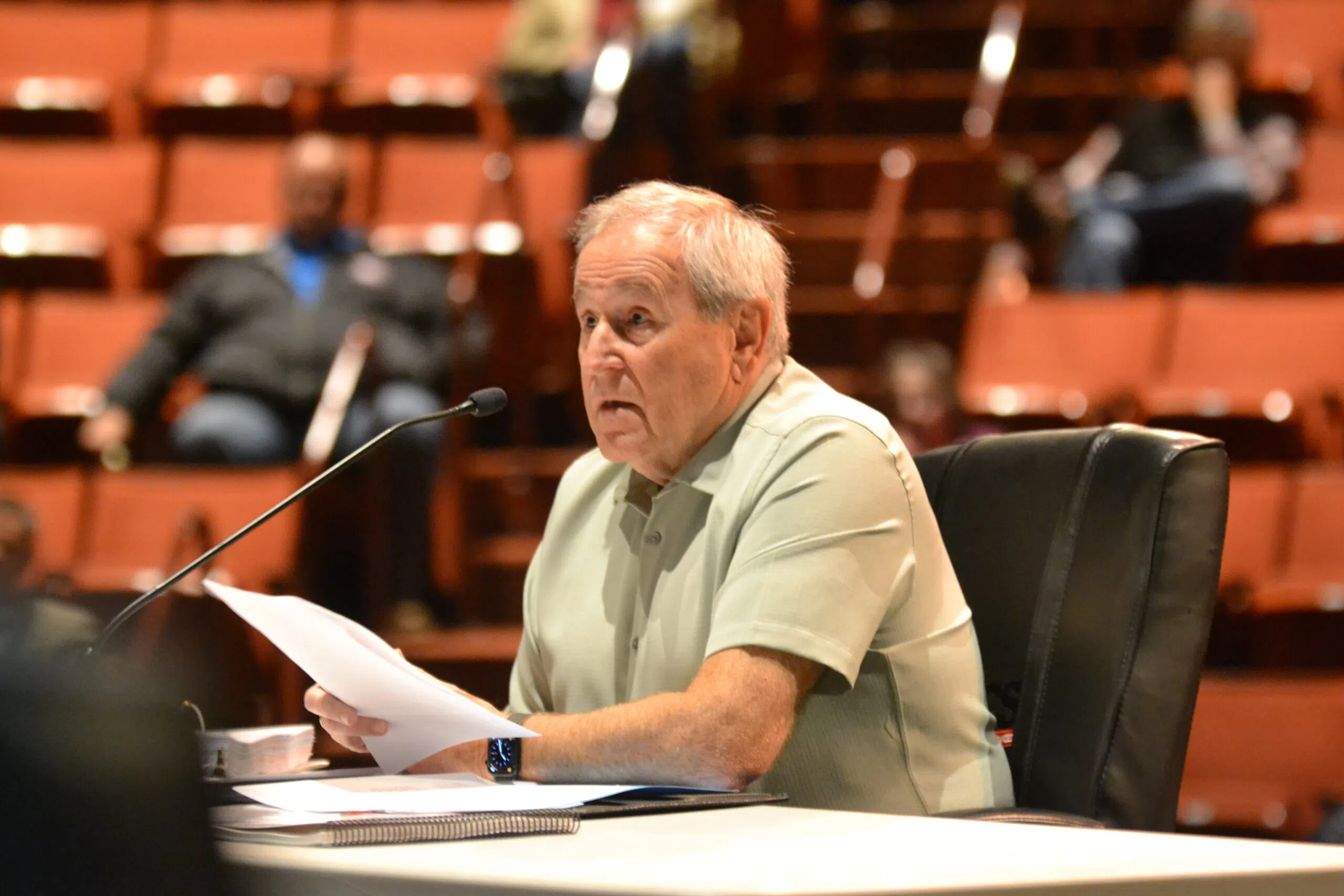
Richland County landowner Loren Staroba testifies May 24, 2024, in Wahpeton, N.D., against the Summit Carbon Solutions pipeline. Summit has applied for a route permit with the North Dakota Public Service Commission. (Jeff Beach/North Dakota Monitor)
BY: JEFF BEACH
WAHPETON, N.D. (North Dakota Monitor) — Communication, or the lack of it, between Summit Carbon Solutions and North Dakota landowners was highlighted in testimony Friday during a Public Service Commission hearing on Summit’s proposed carbon capture pipeline.
Richland County landowner Loren Staroba and other landowners testified that they have been frustrated by a lack of communication throughout the pipeline siting process.
Staroba said Summit sent him a written request for survey access that included wrong information, including identifying that land as being in Dickey County, not Richland.
“Do we want to work with a company that can’t even get the county correct?” Staroba asked.
Staroba said he has proposed a reroute to get the pipeline from cutting across a section, but felt he has been ignored.
He cited other landowners that were able to get the pipeline routed around their property but only because the PSC singled out those landowners after the 2023 round of public hearings.
The three-member PSC denied Summit a pipeline route permit last year but the company has made changes to its route and appealed that decision. The PSC is in the middle of hearings on the Summit pipeline as it reconsiders the company’s application.
Friday’s hearing started with four landowners represented by Domina Law attorney Brian Jorde, who has clients across the footprint of the Summit pipeline, which would run through Iowa, Nebraska, Minnesota, South Dakota and North Dakota.
All four landowners complained that Summit has not communicated with them adequately.
Commissioner Sheri Haugen-Hoffart asked two of those landowners why they hadn’t reached out to Summit in the last year.
Those landowners said they had hoped the project would go away.
Jorde said the burden was on Summit to address the concerns that the landowners have made.
Jorde said letters sent to Summit attorneys a month ago did not elicit a response until those letters were filed with PSC. Then responses came in the last few days.
Later in the all-day hearing, Ben Dotzenrod repeated those complaints.
“The communication has been horrendous, like a lot of people have said,” Dotzenrod said.
Among those testifying in favor of the pipeline were Andew Mauch, who farms in Richland County and is president of the North Dakota Corn Growers Association. He read a statement of support that he said received unanimous approval from the group’s board on the benefits of the pipeline for ethanol and the growers who supply ethanol plants with corn.
He also has signed an easement agreement with Summit. He said Summit has answered his questions about the pipeline, including Summit’s ability to repair drain tile on the fields.
Ryan Carter, chief operating officer of Tharaldson Ethanol at Casselton, the only North Dakota ethanol plant among the 57 plants that have signed on to the Summit carbon capture and sequestration project, also testified.
He said that with the project and other efforts to lower its carbon intensity, Tharaldson Ethanol could become eligible to sell into the emerging sustainable aviation fuel market.
Mauch called that market a once-in-a-lifetime opportunity.
“If we won’t be able to play in this market, our price of corn is dramatically going to be decreased,” Mauch said.
Another farmer, Karla Waloch of Sargent County, said even with the advent of the ethanol industry, “the price of corn has still gone up and down.”
Concerns from the landowners including damage to farmland, pointing to damage to farmland still evident decades after other pipelines were put in.
“The land is scarred,” Starboda said.
Jeanne Lugert said Summit’s offer to compensate farmers in exchange for the voluntary easement fell far short.
“It wasn’t anything,” she said in a response to a Summit attorney. “And since I haven’t heard a single thing from Summit since, I have no idea what you’re going to do.”
Landowners also cited safety concerns. Lugert complained that at a safety meeting held in Mantador that Summit offered little useful information.
“They really didn’t answer the questions,” Lugert said.
Opponents often cite a carbon pipeline rupture in Mississippi in 2022 that sent dozens of people to the hospital. There also was a leak this year in Louisiana.
Iowa-based Summit calls its $8 billion project the world’s largest for capturing carbon. The CO2 would be stored underground northwest of Bismarck.
There would be 22.7 miles in Cass County, running south from the ethanol plant at Casselton. There would be two sections of the 66 miles of pipeline in Richland County. One section would come from the Tharaldson ethanol plant near Casselton. It would connect to a line that would come from the Green Plains ethanol plant at Fergus Falls, Minnesota.
The CO2 would flow through Sargent (40 miles) and Dickey (37.4 miles) before connecting to the main trunk of the pipeline in South Dakota.
Technical hearings, with no public testimony, are set next week in Bismarck. A final public hearing is June 4 in Linton.









Comments